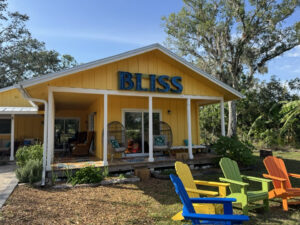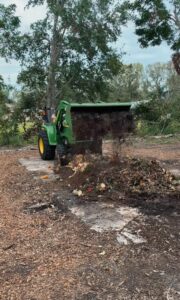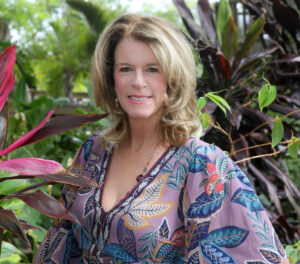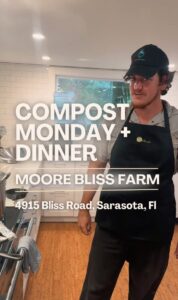Surrounded by suburban Sarasota, Moore Bliss Farm promotes growing food and composting.
Sera Deniz Alemdar
Original Air Date: Feb. 14, 2025
Host: Suburban development swallowed the area in Sarasota around Bliss Road, just South of Proctor near McIntosh, a generation ago. But in the middle of this aging sprawl you can now find a three-acre showcase of agricultural rebirth. Elizabeth Moore is a wealthy preservationist who popped up on the Sarasota radar five years ago when she bought a cattle ranch in the rural east of the county to put it off-limits for developers. Then, in 2022, she bought three acres on Bliss Road. In the three years since, a team of expert-activists have turned the land into Moore Bliss Farm, a showcase of suburban agriculture.
WSLR News intern Sera Deniz put on her boots to talk to Moore and find out what Bliss Farm is all about.

Elizabeth Moore bought three acres of suburban land on Bliss Road. A team of activist-experts turned it into a farm. Photo: Vicki Chelf
Sera Deniz: Welcome to Bliss Farm in Sarasota County, where sustainability meets community. As suburbs continue to sprawl, this small farm is redefining the future of urban agriculture and composting.
Elizabeth Moore: I bought Moore Bliss Farm about three years ago. At the time, I didn’t name it Moore Bliss Farm; it’s sort of evolved into a farm. We don’t have animals here; it’s just all about growing food, Florida-native landscaping, fruit trees, and a vegetable garden. The vegetable garden is nourished by the compost that we make here through Sunshine Community Compost and all the other people who bring their food waste and chips and everything.
SD: At the heart of the farm is composting, and Tracie Troxler — who founded Sunshine Community Compost eight years ago — and Steve Suau — a retired hydrologist and flood management expert — are the driving forces behind it.
Troxler brings food waste from local sources, including the hospital, to fuel the process. Her commitment to sustainability has earned her recognition from a local climate change adaptation organization for her environmental stewardship.
Suau explains how each week the team mixes wood chips, food waste, and horse manure to create rich compost.

Wood chips, food waste, and horse manure. Photo: Bliss Farm
Steve Suau: So what we do here is, we make what’s called compost that has rich biology—good biology in it. That’s really what we’re doing. Every Monday, we put out wood chips and bring in food waste from the hospital. We mix that together with a little bit of horse manure. It’s about 60% woody material, 30% food waste, and 10% horse manure. We’ll mix that all up and we’ll put it in one of these bins here to let it go through a process for a good week to four weeks where it heats up to kill the pathogens and the bad seeds. The microbes that are in there, they feed off the nitrogen that’s in the manure and the food waste, and they create all this energy and heat. That’ll get up to about 150, 160 degrees for several days. That’s really what you need to kill all the pathogens. Once that’s done, we take it apart and we put it over there to cure. We continue to look at it under a microscope to track the progression of the beneficial microbes.
SD: Creating healthy soil without the use of chemical fertilizers, and showing people how to do it, are the core mission of Bliss Farm.

Moore
EM: It’s a real shame that so many restaurants and cafeterias waste food because actually that is gold, if you can just separate all the organic material — leaving out the paper and the glass and the wrappers and the meat — if you could just bring that food — and over time, when you mix it up with horse manure and chips, it actually turns into beautiful soil. I mean, it takes a few weeks, but here we are in Florida, and, it being hot down here, things break down really fast.
SD: Moore believes that teaching others about growing food and composting is crucial as suburban expansion increases the need for local farming and sustainable practices.
EM: What’s important is to see the cycle of food. Over there, there’s probably eight barrels of food waste, and that was all eaten or chopped up, and some of it was people’s lunches at the hospital or whatever. We turn it back into soil; it goes back into the garden, helps to grow new food, grows food again—which goes back into feeding people. It’s a cycle, and for everyone to understand that cycle is really important.
SD: The farm is also looking to collaborate with local schools, such as nearby McIntosh Middle School, and hosting events such as cooking classes and environmental film screenings.

“Compost Monday + Dinner” – screen grab from a promotional video.
EM: One of my ideas is to have, eventually, a little farm stand out front to sell some of the produce that we get out of the garden and around the periphery. As you can see, folks come and they bring their food waste from their kitchens and they just dump it in the pile. It’s really a community event.
I’m trying to get above water, which means I’m still trying to make it pay for itself. I’m really looking to be a businessperson, and true sustainability means it pays for itself—like, I get income by renting out the house for yoga retreats, breathwork, art of living—everybody pays me a small fee to use the facility. That’s a goal of mine. I made a big capital investment, and then I’d like to get an income back, whether it’s from the produce or the events here or classes. I have a few ideas. I love the idea of dinner and a movie. You could pay a certain amount and get a dinner and we go watch a movie and we talk about it, and they would be environmental films.
SD: So, if you’re in Sarasota and looking to get involved, visit Moore Bliss Farm for events, volunteer opportunities, or just to experience the farm firsthand. You will find it at 4915 Bliss Road.
EM: It’s not open to the public, but I like people to come over here. People are welcome. If you self-select — you want to be here — you’re welcome.
Host: That was intern reporter Sera Deniz reporting for WSLR News.
WSLR News aims to keep the local community informed with our 1/2 hour local news show, quarterly newspaper and social media feeds. The local news broadcast airs on Wednesdays and Fridays at 6pm.